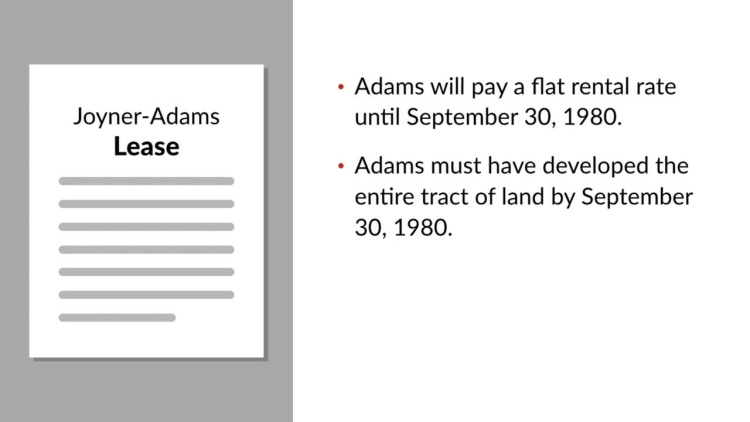Joyner v. Adams
North Carolina Court of Appeals
361 S.E.2d 902 (1987)
- Written by Sarah Larkin, JD
Facts
Joyner (plaintiff) entered into a contract with Brown Investment Company (Brown) for the development of property she owned into an office park, which it would then lease. Brown agreed to lease the property at an annual rent that would increase each year under a specified price index (the “base lease”). Due to financial difficulties, Adams (defendant) was substituted for Brown as the lessee/developer. Both Joyner and Adams were experienced in real estate business. After protracted negotiations, the parties entered into a new lease. The new lease allowed Adams to pay a fixed annual rent for a period of time until he had developed all lots on the land. However, if Adams failed to develop all lots by a specified date, Adams would then be required to pay annual rent under the base lease, rather than pay the fixed rate. By the specified date, Adams had developed all but one lot. Joyner filed suit seeking to recover the difference between the fixed annual rent and the rent under the base lease. Adams filed a motion for summary judgment. The trial court granted Adams’s motion. Joyner appealed to the North Carolina Court of Appeals. The court of appeals reversed and remanded for a factual finding of the parties’ intent regarding when the rent calculation of the base lease would be applied. On remand, the trial court determined that the clause was ambiguous and that it had been drafted by Adams. The court held in Joyner’s favor. Adams appealed to the North Carolina Court of Appeals.
Rule of Law
Issue
Holding and Reasoning (Eagles, J.)
What to do next…
Here's why 911,000 law students have relied on our case briefs:
- Written by law professors and practitioners, not other law students. 47,100 briefs, keyed to 997 casebooks. Top-notch customer support.
- The right amount of information, includes the facts, issues, rule of law, holding and reasoning, and any concurrences and dissents.
- Access in your classes, works on your mobile and tablet. Massive library of related video lessons and high quality multiple-choice questions.
- Easy to use, uniform format for every case brief. Written in plain English, not in legalese. Our briefs summarize and simplify; they don’t just repeat the court’s language.





